- Home
- Hanif Kureishi
Love in a Blue Time Page 12
Love in a Blue Time Read online
Page 12
‘Yes, that’s right,’ Laura said. ‘Nothing human there. A bunch of robots on drugs.’
‘You don’t mean that,’ said Brian.
A few days after the visit Brian made the strange request.
‘She enjoyed meeting you,’ he was saying, as Eshan read his newspaper in the pub.
‘And me her,’ Eshan murmured without raising his eyes. ‘Anyone would.’
It cheered Brian to hear her praised. ‘She’s pretty, eh?’
‘No, beautiful.’
‘Yes, that’s it, you’ve got the right word.’
He picked up his phone. ‘She wants to ask you a favour. Can she join us?’
‘I’ve got to go.’
‘Of course, you’ve got to put the kids to bed, but I think you’ll find it an interesting favour.’
Laura arrived within fifteen minutes. She sat down at their table and began.
‘What we want is for you to photograph us.’
Eshan nodded. Laura glanced at Brian. ‘Naked. Or we could wear things. Rings through our belly buttons or something. But anyway – making love.’ Eshan looked at her. ‘You photograph us fucking,’ she concluded. ‘Do you see?’
Eshan didn’t know what to say.
She asked, ‘What about it?’
‘I am not a pornographer.’
It must have sounded pompous. She gave him an amused look.
‘I’ve seen your stuff, and we haven’t the nerve for pornography. It isn’t even beauty we want. And I know you don’t go for that.’
‘No. What is it?’
‘You see, we go to bed and eat crackers and drink wine and caress one another and chatter all day. We’ve both been through terrible things in our lives, you see. Now we want to capture this summer moment – I mean we want you to capture it for us.’
‘To look back on?’
She said, ‘I suppose that is it. We all know love doesn’t last.’
‘Is that right?’ said Eshan.
Brian added, ‘It might be replaced by something else.’
‘But this terrible passion and suspicion … and the intensity of it … will get domesticated.’ She went on, ‘I think that when one has an idea, even if it is a queer one, one should follow it through, don’t you?’
Eshan supposed he agreed with this.
Laura kissed Brian and said to him, ‘Eshan’s up for it.’
‘I’m not sure,’ said Brian.
Eshan had picked up his things, said goodbye and reached the door, before he returned.
‘Why me?’
She was looking up at him.
‘Why? Brian has run into you with your children. You’re a kind father, a normal man, and you will surely understand what we want.’ Eshan looked at Brian, who had maintained a neutral expression. She said, ‘But … if it’s all too much, let’s forget it.’
It was an idea they’d conceived frivolously. He would give her the chance to drop the whole thing. She should call in the morning.
He thought it over in bed. When Laura made the request, though excited, she hadn’t seemed mad or over-ebullient. It was vanity, of course, but a touching, naive vanity, not a grand one; and he was, more than ever, all for naivety. Laura was, too, a woman anyone would want to look at.
*
An old upright piano and guitar; painted canvases leaning against the wall; club fliers, rolling papers, pills, a razor blade, beer bottles empty and full, standing on a chest of drawers. Leaning against this, a long mirror. The bed, its linen white, was in the centre of the room.
Laura pulled the curtains, and then half-opened them again.
‘Will you have enough light?’
‘I’ll manage,’ Eshan whispered.
Brian went to shave. Then, while Eshan unpacked his things, he plucked at the guitar with his mouth open, and drank beer. The three of them spoke in low voices and were solicitous of one another, as if they were about to do something dangerous but delicate, like planting a bomb.
A young man, covered in spots, wandered into the room.
‘Get out now and go to bed,’ Laura said. ‘You’ve got chickenpox. Everyone here had it?’ she asked.
They all laughed. It was better then. She put a chair against the door. They watched her arrange herself on the bed. Eshan photographed her back; he photographed her face. She took her clothes off. The breeze from the open window caressed her. She stretched out her fingers to Brian.
He walked over to her and they pressed their faces together. Eshan photographed that. She undressed him. Eshan shot his discomfort.
Soon they were taking up different positions, adjusting their heads, putting their hands here and there for each shot. Brian began to smile as if he fancied himself as a model.
‘It’s very sweet, but it ain’t going to work, Eshan told them. ‘There’s nothing there. It’s dead.’
‘He might be right,’ Laura told Brian. ‘We’re going to have to pretend he’s not here.’
Eshan said, ‘I’ll put film in the camera now, then.’
*
Eshan didn’t go to bed but carried his things through the dark city back to his studio. He developed the material as quickly as he could and when it was done went home. His wife and children were having breakfast, laughing and arguing as usual. He walked in and his children kept asking him to take off his coat. He felt like a criminal, though the only laws he’d broken were his own, and he wasn’t sure which ones they were.
Unusually he had the pictures with him and he went through them several times as he ate his toast, keeping them away from the children.
‘Please, can I see?’ His wife put her hand on his shoulder. ‘Don’t hide them. It’s a long time since you’ve shown me your work. You live such a secret life.’
‘Do I?’
‘Sometimes I think you’re not doing anything at all over there but just sitting.’
She looked at the photographs and then closed the folder.
‘You stayed out all night without getting in touch. What have you been doing?’
‘Taking pictures.’
‘Don’t talk to me like that. Who are these people, Eshan?’
‘People I met in the pub. They asked me to photograph them.’
They went into the kitchen and she closed the door. She could be very disapproving, and she didn’t like mysteries.
‘And you did this?’
‘You know I like to start somewhere and finish somewhere else. It wasn’t an orgy.’
‘Are you going to publish or sell them?’
‘No, They paid me. And that’s it.’
He got up.
‘Where are you going?’
‘Back to work.’
‘If this the same kind of thing you’ll be doing today?’
‘Ha ha ha.’
He tried to resume his routine but couldn’t work, or even listen to music or read the papers. He could only look at the pictures. They were not pornography, being too crude and unembellished for that. He had omitted nothing human. All the same, the images gave him a dry mouth, exciting and distressing him at the same time. He wouldn’t be able to start anything else until the material was out of the studio.
He thought Brian would have gone back to his place, but wasn’t certain. However, he couldn’t persuade himself to ring first. He took a chance and walked all the way back there again. He was exhausted but was careful to cross the road where he crossed it before.
She came to the door in her dressing gown, and was surprised to see him. He said he’d brought the stuff round, and proffered the folder as evidence.
He went past her and up the stairs. She tugged her dressing gown around herself, as if he hadn’t seen her body before. Upstairs they sat on the broken sofa. She was reluctant to look at the stuff, but knew she had to. She held up the contact sheets, turning them this way and that, repeatedly.
‘Is that what you wanted?’ he asked.
‘I don’t know.’
‘Is that what you do on a good
day?’
‘I should thank you for the lovely job you’ve done. I don’t know what I can do in return.’ He looked at her. She said, ‘How about a drum lesson?’
‘Why not?’
She took him into a larger room, where he noticed some of Brian’s gifts. Set before a big window, with a view of the street and the square, was her red spangled kit. She showed him how she played, and demonstrated how he could. Soon this bored her and she made lunch. As he ate she returned to the photographs, glanced through them without comment, and went back to the table. He wasn’t certain that she wanted him there. But she didn’t ask him to go away and seemed to assume that he had nothing better to do. He didn’t know what else he would do anyway, as if something had come to an end.
They started to watch television, but suddenly she switched it off and stood up and sat down. She started agitatedly asking him questions about the people he knew, how many friends he had, what he liked about them, and what they said to one another. At first he answered abruptly, afraid of boring her. But she said she’d never had any guidance, and for the past few years, like everyone else, had only wanted a good time. Now she wanted to find something important to do, wanted a reason to get out of bed before four. He murmured that fucking might be a good excuse for staying in bed, just as the need to wash was an excuse for lying in the bath. She understood that, she said. She hardly knew anyone with a job; London was full of drugged, useless people who didn’t listen to one another but merely thought all the time of how to distract themselves and never spoke of anything serious. She was tired of it; she was even tired of being in love; it had become another narcotic. Now she wanted interesting difficulty, not pleasure or even ease.
‘And look, look at the pictures …’
‘What do they say?’
‘Too much, my friend.’
She hurried from the room. After a time she returned with a bucket which she set down on the carpet. She held the photographs over it and invited him to set fire to them.
‘Are you sure?’ he said.
‘Oh yes.’
They singed the carpet and burned their fingers, and then they threw handfuls of ash out of the window and cheered.
‘Are you going to the pub now?’ she asked as he said goodbye.
‘I don’t think I’ll be going there for a while.’
He told her that the next day he was going to photograph a painter who had also done record covers. He asked her to come along, ‘to have a look’. She said she would.
Leaving the house he crossed the street. He could see her sitting in the window playing. When he walked away he could hear her all the way to the end of the road.
My Son the Fanatic
Surreptitiously the father began going into his son’s bedroom. He would sit there for hours, rousing himself only to seek clues. What bewildered him was that Ali was getting tidier. Instead of the usual tangle of clothes, books, cricket bats, video games, the room was becoming neat and ordered; spaces began appearing where before there had been only mess.
Initially Parvez had been pleased: his son was outgrowing his teenage attitudes. But one day, beside the dustbin, Parvez found a torn bag which contained not only old toys, but computer discs, video tapes, new books and fashionable clothes the boy had bought just a few months before. Also without explanation, Ali had parted from the English girlfriend who used to come often to the house. His old friends had stopped ringing.
For reasons he didn’t himself understand, Parvez wasn’t able to bring up the subject of Ali’s unusual behaviour. He was aware that he had become slightly afraid of his son, who, alongside his silences, was developing a sharp tongue. One remark Parvez did make, ‘You don’t play your guitar any more,’ elicited the mysterious but conclusive reply, ‘There are more important things to be done.’
Yet Parvez felt his son’s eccentricity as an injustice. He had always been aware of the pitfalls which other men’s sons had fallen into in England. And so, for Ali, he had worked long hours and spent a lot of money paying for his education as an accountant. He had bought him good suits, all the books he required and a computer. And now the boy was throwing his possessions out!
The TV, video and sound system followed the guitar. Soon the room was practically bare. Even the unhappy walls bore marks where Ali’s pictures had been removed.
Parvez couldn’t sleep; he went more to the whisky bottle, even when he was at work. He realised it was imperative to discuss the matter with someone sympathetic.
Parvez had been a taxi driver for twenty years. Half that time he’d worked for the same firm. Like him, most of the other drivers were Punjabis. They preferred to work at night, the roads were clearer and the money better. They slept during the day, avoiding their wives. Together they led almost a boy’s life in the cabbies’ office, playing cards and practical jokes, exchanging lewd stories, eating together and discussing politics and their problems.
But Parvez had been unable to bring this subject up with his friends. He was too ashamed. And he was afraid, too, that they would blame him for the wrong turning his boy had taken, just as he had blamed other fathers whose sons had taken to running around with bad girls, truanting from school and joining gangs.
For years Parvez had boasted to the other men about how Ali excelled at cricket, swimming and football, and how attentive a scholar he was, getting straight ‘A’s in most subjects. Was it asking too much for Ali to get a good job now, marry the right girl and start a family? Once this happened, Parvez would be happy. His dreams of doing well in England would have come true. Where had he gone wrong?
But one night, sitting in the taxi office on busted chairs with his two closest friends watching a Sylvester Stallone film, he broke his silence.
‘I can’t understand it!’ he burst out. ‘Everything is going from his room. And I can’t talk to him any more. We were not father and son – we were brothers! Where has he gone? Why is he torturing me!’
And Parvez put his head in his hands.
Even as he poured out his account the men shook their heads and gave one another knowing glances. From their grave looks Parvez realised they understood the situation.
‘Tell me what is happening!’ he demanded.
The reply was almost triumphant. They had guessed something was going wrong. Now it was clear. Ali was taking drugs and selling his possessions to pay for them. That was why his bedroom was emptying.
‘What must I do then?’
Parvez’s friends instructed him to watch Ali scrupulously and then be severe with him, before the boy went mad, overdosed or murdered someone.
Parvez staggered out into the early morning air, terrified they were right. His boy – the drug addict killer!
To his relief he found Bettina sitting in his car.
Usually the last customers of the night were local ‘brasses’ or prostitutes. The taxi drivers knew them well, often driving them to liaisons. At the end of the girls’ shifts, the men would ferry them home, though sometimes the women would join them for a drinking session in the office. Occasionally the drivers would go with the girls. ‘A ride in exchange for a ride,’ it was called.
Bettina had known Parvez for three years. She lived outside the town and on the long drive home, where she sat not in the passenger seat but beside him, Parvez had talked to her about his life and hopes, just as she talked about hers. They saw each other most nights.
He could talk to her about things he’d never be able to discuss with his own wife. Bettina, in turn, always reported on her night’s activities. He liked to know where she was and with whom. Once he had rescued her from a violent client, and since then they had come to care for one another.
Though Bettina had never met the boy, she heard about Ali continually. That late night, when he told Bettina that he suspected Ali was on drugs, she judged neither the boy nor his father, but became businesslike and told him what to watch for.
‘It’s all in the eyes,’ she said. They might be bloodshot; the pupils
might be dilated; he might look tired. He could be liable to sweats, or sudden mood changes. ‘Okay?’
Parvez began his vigil gratefully. Now he knew what the problem might be, he felt better. And surely, he figured, things couldn’t have gone too far? With Bettina’s help he would soon sort it out.
He watched each mouthful the boy took. He sat beside him at every opportunity and looked into his eyes. When he could he took the boy’s hand, checking his temperature. If the boy wasn’t at home Parvez was active, looking under the carpet, in his drawers, behind the empty wardrobe, sniffing, inspecting, probing. He knew what to look for: Bettina had drawn pictures of capsules, syringes, pills, powders, rocks.
Every night she waited to hear news of what he’d witnessed.
After a few days of constant observation, Parvez was able to report that although the boy had given up sports, he seemed healthy, with clear eyes. He didn’t, as his father expected, flinch guiltily from his gaze. In fact the boy’s mood was alert and steady in this sense: as well as being sullen, he was very watchful. He returned his father’s long looks with more than a hint of criticism, of reproach even, so much so that Parvez began to feel that it was he who was in the wrong, and not the boy!
‘And there’s nothing else physically different?’ Bettina asked.
‘No!’ Parvez thought for a moment. ‘But he is growing a beard.’
One night, after sitting with Bettina in an all-night coffee shop, Parvez came home particularly late. Reluctantly he and Bettina had abandoned their only explanation, the drug theory, for Parvez had found nothing resembling any drug in Ali’s room. Besides, Ali wasn’t selling his belongings. He threw them out, gave them away or donated them to charity shops.
Standing in the hall, Parvez heard his boy’s alarm clock go off. Parvez hurried into his bedroom where his wife was still awake, sewing in bed. He ordered her to sit down and keep quiet, though she had neither stood up nor said a word. From this post, and with her watching him curiously, he observed his son through the crack in the door.

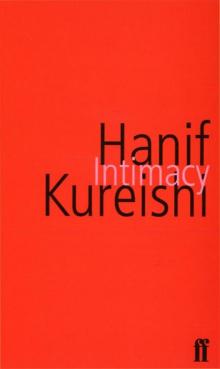 Intimacy
Intimacy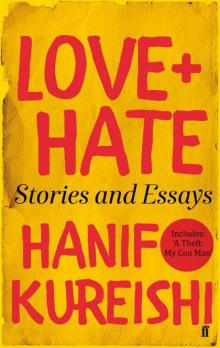 Love + Hate: Stories and Essays
Love + Hate: Stories and Essays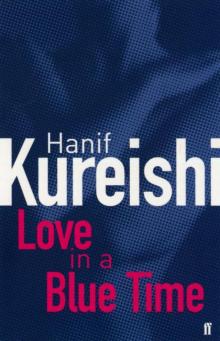 Love in a Blue Time
Love in a Blue Time Something to Tell You
Something to Tell You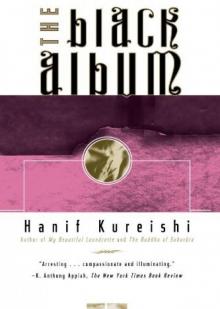 The Black Album
The Black Album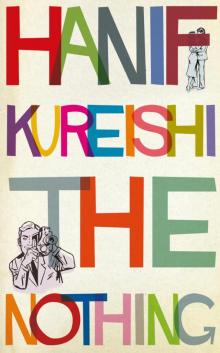 The Nothing
The Nothing Gabriel's Gift
Gabriel's Gift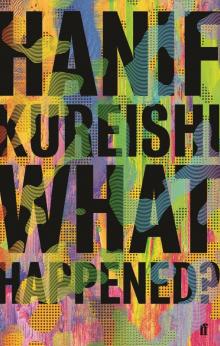 What Happened?
What Happened? Midnight All Day
Midnight All Day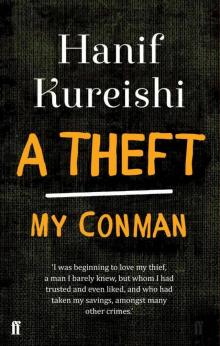 A Theft: My Con Man
A Theft: My Con Man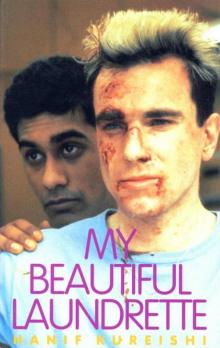 My Beautiful Launderette
My Beautiful Launderette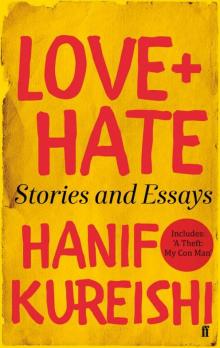 Love + Hate
Love + Hate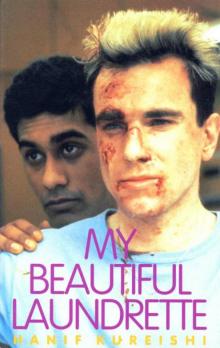 My Beautiful Laundrette
My Beautiful Laundrette The Buddha of Suburbia
The Buddha of Suburbia